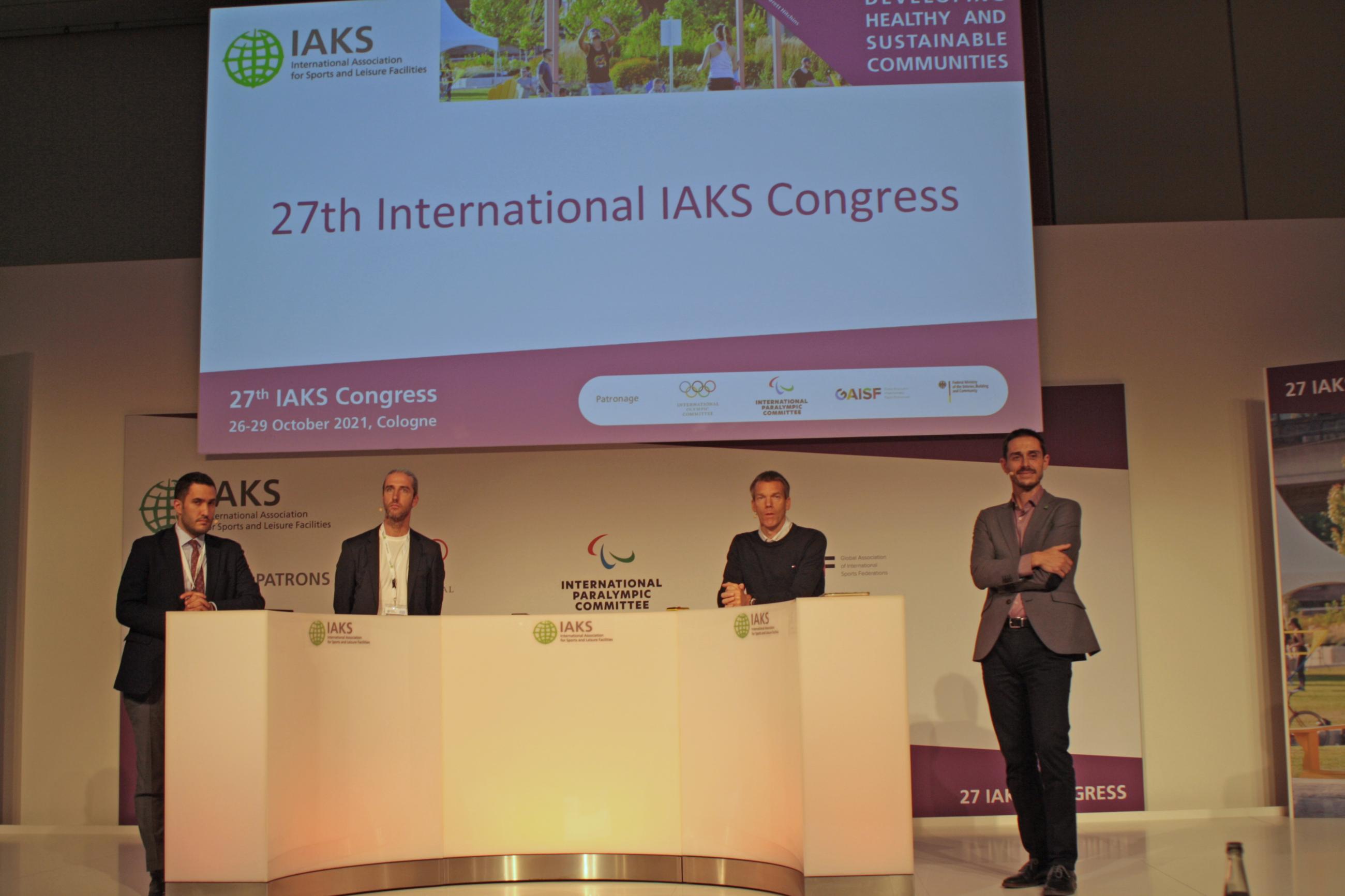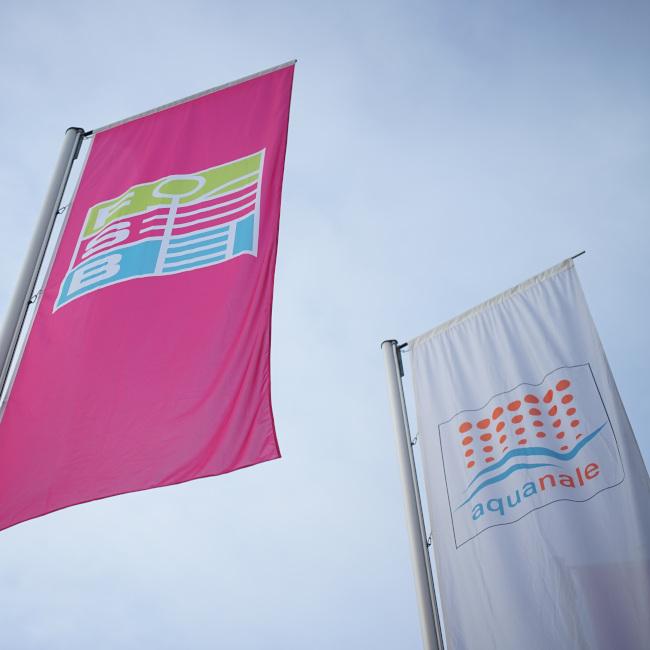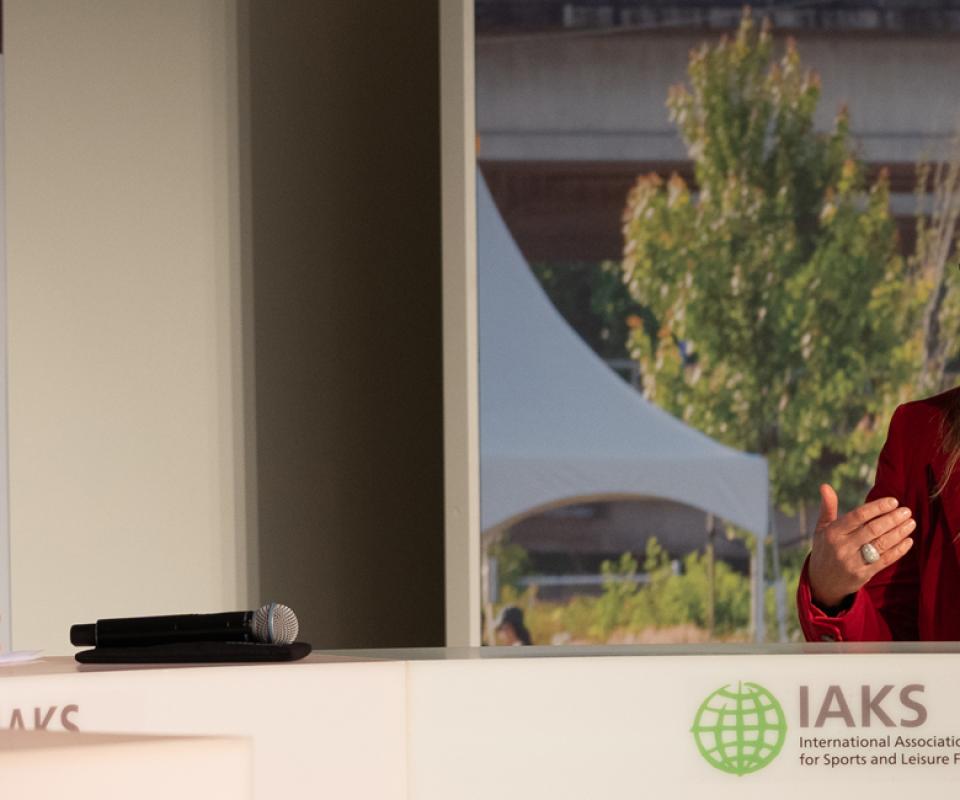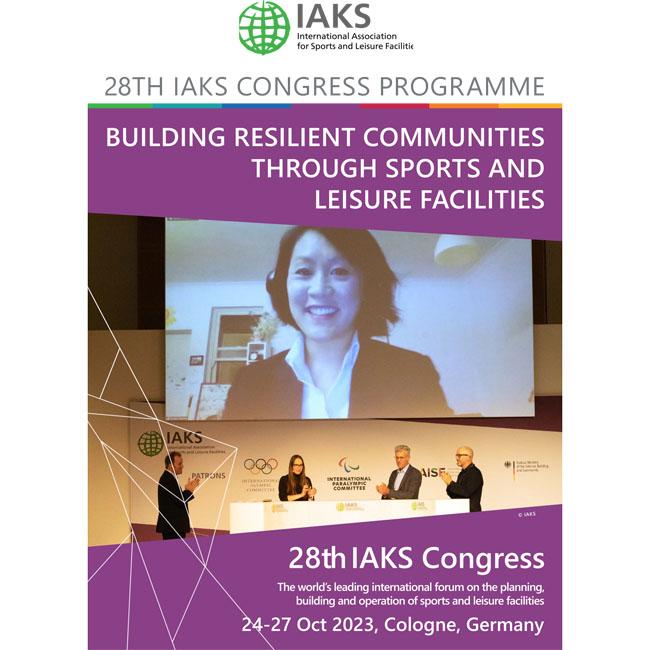Click on picture to download full agenda or scroll down for timetable
Secure your attendance now to the industry's largest gathering. Day passes starting at EUR 70.
Save time, cut costs and maximise networking time. Secure your place here and check discount codes first.
Tuesday, 24 October 2023: Global challenges and global initiatives
Global challenges and global initiatives
Moderator: Tom Jones, IAKS Vice President, United Kingdom
Welcome and introduction / IAKS Trends Report
Dr Stefan Kannewischer, IAKS President, Switzerland
The impact of megatrends on the sports business
Marcel Aberle, Zukunftsinstitut, Germany
Paris 2024 "Move more" programme
Damien Combredet-Blassel, Paris 2024, France
Access for everybody – Benefits of inclusive design for the whole community
Jennifer Camulli, Direct Access, UAE
The 2023 IAKS Congress brings together challenges, trends, impact, forward-thinking, and international expertise.
Which are the current developments and trends in the industry? How do megatrends change our society and economy? What do we need to know when making decisions for tomorrow? Which trends will create an impact on us if we like it or not?
Which efforts are made to tackle the major public health issue that is sedentary lifestyles, but also to promote a gender-equal use of schoolyard spaces, attractivity of town centres, and quality of life in workplaces, after a lockdown period that has profoundly changed people’s relation to work?
Inclusive design is one of the areas that demonstrates how a community-based approach can create benefit for the whole society.
Coffee break and visit of FSB
The activity path to Brisbane 2032 and beyond
Moderator: Yvette Audet, IAKS Vice President, Australia
Activating Australia towards Brisbane 2032
Andrew Sly, Deputy Director-General, Sport and Recreation & Corporate Services, Queensland Government, Australia
The Australian sports and recreation facility market
Martin Sheppard, Smart Connection Consultancy, Australia
Designing for women sports: Don’t segment us, include us!
Irina Akhmanova, Populous, Singapore
The Australian aquatic facility market
RJ Houston, Royal Life Saving Society, Australia
Active Victoria 2022-2026 – Getting Victoria Active through Community Sports Infrastructure Investment
Philip Saikaly, Sport and Recreation Victoria, Australia
Australia is one of the most promising markets for the sports and leisure facility industry. Hosting not only the 2032 Brisbane Olympic and Paralympic Games, but also a number of World Championships and World Cups in different sports, this session will introduce the size and complexity of the Australian market, the sectors that its segmented into, with the challenges around governance, value, and impact on society.
As a special focus, we will look at the approximate 1,300 public aquatic facilities across Australia that are available for public swimming, most of them funded and built by governments. As many of them are approaching the end of their life, additional research into the state of aquatic facilities and the likely timeframes for their upgrade and replacement nationwide will be presented.
Welcome to Australia: Happy hour for IAKS members and friends
Meet & greet at the IAKS booth
2023 IOC IPC IAKS Architecture Prize Ceremony
Representatives of the IOC, IPC and IAKS will present the prizes to the architects and operators of the award-winning facilities in the presence of 200 guests. Who is going to receive one of the much-coveted awards for exemplary architecture?
Be sure not to miss this unique event. Enjoy a festive evening, meet top-notch personalities from the industry, government, sport, and society, and be there at first hand when the winners are announced.
Wednesday, 25 October 2023: Environmental and climate challenges
Today’s design decisions and future-oriented programming
Moderator: Prof. PhD Benjamin Flowers, Knowlton School, USA
Sustainable sport facilities – a threat or a new opportunity?
Oliver Vanges, LOA Fonden, Denmark
No more “White Elephants”! National Athletics Center for the World Athletics Championships Budapest 23
Bernd Helmstadt, Nussli, Switzerland
Prof. Marcel Ferencz, NAPUR Architects, Hungary
The FIBA Venue Guide: Fostering quality, innovation, technology, and sustainability in basketball facilities
Jasmine Long, FIBA, Switzerland
Accelerating organizational change and connecting community through building design: Clayton Community Centre and beyond
Scott Groves, Township of Langley, Canada
A building’s lifespan often exceeds 40 years and more. Especially public buildings need to envision future use. This session will dig deep into the ways that we can change and improve our communities by challenging preconceptions on what is best. Sustainability, accessibility, inclusiveness, and togetherness need to be targeted at the local level, while not forgetting about the global climate goals. How does this all come together, and which contradictions may occur? Can new architectural approaches nudge sports activities to be more flexible and adaptive? Learn from best practices for big structures for major sporting events as well as for community facilities.
Lunch break and visit of FSB
Reducing the carbon footprint
Moderator: Prof. PhD Benjamin Flowers, Knowlton School, USA
Minimizing the carbon footprint of sports and leisure buildings
Mike Hall, FaulknerBrowns Architects, United Kingdom
The product passport sustainability
Theresa Rüdiger, TFI – Institute for flooring systems at RWTH Aachen e.V., Germany
Environmentally sustainable stadium renovation in Strasbourg
David Jarratt, Populous, United Kingdom
Tackling the carbon footprint brings unique challenges to the sports and leisure industry, from high energy consumption to the difficulties in maintaining, re-purposing, and retrofitting existing facilities. Lifecycle carbon assessment studies on aquatics projects as well as energy data gathered from recent post-occupancy studies will show the importance of balancing carbon, cost, and culture over the life of a leisure building. An important step for every building project is the integration of sustainability requirements into the tendering process. To assess and evaluate the sustainability performance of building products and materials, sustainability systems at product level can provide initial indications.
Coffee break and visit of FSB
IAKS General Assembly
(only for IAKS members)
Happy hour for IAKS members and friends
Meet & greet at the IAKS booth
Nations’ night for IAKS members
Full of impressions after an exciting day at the IAKS Congress and FSB/aquanale trade fairs? Do you want to follow up with your peers on what you have experienced throughout the day? Join us to meet and to enjoy international exchange and networking in a casual atmosphere. The IAKS Nations’ Night is an exclusive event for IAKS members.
Location:
Bierhaus en d’r Salzgass, Salzgasse 5-7, 50667 Köln (old town centre)
www.bierhaus-salzgass.de
Bierhaus en d’r Salzgass is a traditional Cologne brewery restaurant, with regional food, Kolsch beer and other beverages. Guests will pay on their own account.
We need to confirm the reservation by Wednesday 18 October 2023, thus all members that are interested to join need to register in advance (reservation at no cost).
Thursday, 26 October 2023: Well-being, active living, inclusivity, and the public realm
Socially relevant design: A commitment to the community
Moderator: Ola Mattsson, LOA Fonden, Denmark
The community well-being framework
Marion LaRue, DIALOG, Canada
Cynthia Watson, VIVO for Healthier Generations, Canada
The Active City of Hamburg: Goals and master planning for the new “Oberbillwerder” neighbourhood
Moritz Vahldiek, IBA Hamburg, Germany
Social inequality related to participation in sports and physical activity: The perspectives of girls with immigrant background
Lisa Mari Watson, Tverga The Norvegian Resource Centre of self-organized sports, Norway
Planning a new city district offers huge opportunities, especially if active living is on top of the agenda. Why is an “active city” of value from a developer’s perspective?
Sports buildings are part of public social provision. First and foremost, they should cater for the local community. Which strategies can practitioners apply to guide and evaluate design criteria that define their projects?
And how to consider less physically active groups such as girls with immigrant background? What affects them, what motivates them and what barriers do they experience?
Planning carbon reduced pools
Moderator: Jeanne Ng, MJMA Architecture & Design Canada
Design and construction of Ravelin Sports Centre
Irina Korneychuk, FaulknerBrowns Architects, United Kingdom
Operations of Ravelin Sports Centre
Mark Palmer, Ravelin Sports Centre, United Kingdom
Indicators for sustainable planning of pools
Prof. Dr Natalie Eßig, Munich University of Applied Sciences, Germany
Stainless steel: the most sustainable way of building public pools
Romain Duflos, Berndorf Bäderbau, Austria
The key factors to drive swimming pools design along the path of circularity
Innocenzo Pochini, Myrtha Pools, Italy
Ravelin Sports Centre is the new BREEAM outstanding sports facility for the University of Portsmouth, UK. The architect and the operator will demonstrate how low carbon design and low energy operations can be achieved.
Speakers from science and research will then explain indicators and factors to better understand the most important steps for making pools more sustainable buildings on the way to circularity, as well as look at the influence of the most important building components.
Lunch break and visit of FSB
The challenge of true inclusivity
Moderator: Gar Holohan, Holohan Group, Ireland
No time like the present: Optimizing recreation facilities for gender equity
Mary Chow, HDR Architecture Associates, Canada
Consultation and participation process: The Danish experience
Jens Øyås Møller, LOA Fonden, Denmark
Universal design and its impact on the business case: The Canadian experience
Darryl Condon, HCMA Architecture + Design, Canada
The conversation about gender equity is not new, and yet the challenges persist and, in some ways, have been exacerbated by the pandemic. Parks and recreation organizations are taking this issue through programming, partnerships, and awareness campaigns. But what are the barriers within the physical environment? And what strategies can be used to overcome them?
The inclusive design outdoor project “Troldhedestien” will be presented as an example on how The Danish Foundation for Culture and Sports Facilities has worked with involving vulnerable groups aiming to sink the barriers of participation in outdoor activities.
Making the design process more accessible to people and inviting more voices to the table shall shape better human connections and help answer the complex and interdependent problems that communities are facing.
Coffee break and visit of FSB
Enhancing and activating the public domain
Moderator: Shaun Dawson, Lee Valley Regional Park Authority, UK
Learnings from being a Global Active City
Alister Dalrymple, Evaleo, Switzerland
The Power of Movement (Data)
Ben Jones, ActiveChange, UK
Sustainable sports park design and community based active design
Prof. Dr Takanori Fukuoka, Tokyo Univ. of Agriculture, Dept. of Landscape Architecture Science, Japan
Completing sports infrastructure for a better utilization
Leon van Dijk, Team SportBox, Germany
An active living strategy means multiple efforts at the local level: Putting physical activity at the heart of multisectoral strategies and policies; making it a driving force to impact health and well-being; focus on organised and self-organised sports activities; implementation, and continuous improvement of a system-based approach in the short, medium and long term; and understanding the city as a facilitator of a local dynamic of partnerships and networks, accessibility and inclusiveness.
This session will offer learnings from global active cities from around the world, tools to better understand the impact on the activity level and show best practices of small interventions that can make the difference.
Happy hour for IAKS members and friends
Meet & greet at the IAKS booth
Friday, 27 October 2023: Synthetic turf surfaces: Benefits and challenges
Changing the Narrative: The Future of the Sports Surfaces Sector
Moderator: Claus Weberstorfer, Neveon, Austria
Changing the narrative
Martin Sheppard, Smart Connection Consultancy, Australia
The environmental challenges facing the sector
Alastair Cox, ESTC, United Kingdom
The circular economy strategy
Stefan Diderich, ESTC, Belgium
KG2021 – a project on future synthetic surfaces
Bjørn Aas, COWI, Norway
Discussing the positive aspects of synthetic sports surfaces is the way for the future. Embracing the negative energy from a small number of interest groups can be changed into positive solutions that can make a difference to the next generation of users, in a safe and environmentally positive manner.
The panel will explore this new industry initiative between IAKS, ESTC (EMEA), STC (America’s) and NSC (Asia Pacific), where the four organisations aim to develop a common approach to Changing the Narrative so that the industry can continue good practice globally to counter some of the challenges.
End of IAKS Congress / Lunch break and visit of FSB
Building resilient communities through sports and leisure facilities
This year's IAKS Congress will focus on "Building resilient communities through sport and leisure facilities". From 24 to 27 October 2023, the IAKS Congress, in its 28th edition already, will be the most important international forum for planning, construction, financing and management of sports and leisure facilities for experts in sports facility construction from all over the world.
On the four days of the congress, the IAKS will invite international speakers from science, sport and architecture. They will discuss the challenges and opportunities that move clients, local authorities, technical and operational management, architects, designers and engineers all the way to sports federations and clubs.
In exciting lectures, panel discussions and workshops, international experts will provide innovative thinking to pressing questions (see programme outline below).
Congress registration has opened and offers attractive early bird tickets starting at 65 EUR.

Your place to be from 24-27 Oct 2023: Cologne, Germany

The International Trade Fair for Public Space, Sports and Leisure Facilities (FSB) will be held in Halls 9, 10.1 and 10.2 of the Cologne Exhibition Centre at the same time as the 28th IAKS Congress. FSB as the industry’s leading international platform covers every- thing relating to public spaces, playground equipment, outdoor fitness, sports equipment, sports flooring and stadium infrastructure.
Not to miss: The award presentation ceremony for this year’s IOC IPC IAKS Architecture Prizes will also generate exciting stimuli. The gala will take place on 24 October and celebrate the most innovative ideas of our industry and their creators.

